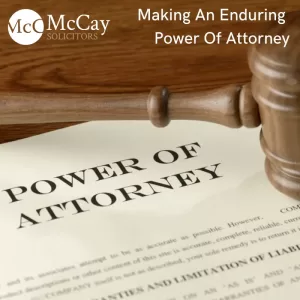
An Enduring Power of Attorney is an instrument wherein a person; (known as the donor), can appoint a person or people; (known as their Attorneys), to deal with their property and affairs which continues if the unfortunate situation arises wherein the donor becomes mentally incapable of handling such affairs. Just like making a Will, the beauty about an Enduring Power of Attorney is you can tailor it to your own individual needs and preferences. Important features and things to think about are as follows:
1. If you are looking to appoint more than one Attorney you must decide whether you would like them to act jointly or jointly and severally. If you choose for your Attorneys to act jointly, they must do everything together. By electing for your Attorneys to act jointly and severally, this means they would be able to act together but also act separately if they wish. For example, if you appointed two Attorneys and immediate access was needed to your finances, if you have chosen on your Enduring Power of Attorney for your Attorneys to act jointly and one Attorney is on holiday, the other Attorney would not be able to act until their return.
2. You must decide whether you would like your Attorney(s) to deal with all your property and affairs or specific matters. By giving your Attorney(s) general authority to act in relation to all your property and affairs your Attorney(s) essentially have the power to deal with everything on your behalf; bearing in mind they must deal with your property and affairs as you would have done when you were able to do so. Things to consider are, by giving your Attorney(s) general authority to deal with everything; in certain situations if it ever became necessary, your Attorney(s) would have the power to sell your property and make gifts to benefit other persons. For example if you gave each grandchild £50.00 at Christmas, your Attorney(s) could continue to do so from your Assets. You can therefore make your Enduring Power of Attorney specific and include restrictions and limitations such as confirming that this Instrument does not give your Attorney(s) the power to sell property. On the other hand if you make your Enduring Power of Attorney with reservations; for example that your Attorney(s) only has authority to deal with one account on your behalf, if you were ever to become incapable of managing your affairs, this is the only matter your Attorney(s) could deal with and they would not have the power under this Instrument to deal with any other matters on your behalf. If it was the case then that your assets comprised of more than the one account you have given your Attorney(s) authority to deal with on your behalf; then a Controllership application would have to be made to the Office of Care and Protection for someone to be appointed as your Controller to deal with all other assets. Indeed your Attorney(s) could apply to be appointed as your Controller in relation to all other assets. Applying to become a Controller is a lengthier process and is also something we at McCay Solicitors specialise in.
3. You must decide whether you would like your Attorney(s) powers to come into effect now while you are still capable of dealing with your affairs or whether you want to put a restriction in place that your Attorney(s) powers to deal with your property and affairs only commence when you no longer have the mental capacity to deal with your property and affairs. If you wish for your Attorney(s) to be able to act immediately rather than only if you become mentally incapable of handing your affairs, indeed you would still have the ability to give instructions to your Attorney(s) as to how you want your property and affairs dealt with. Whether you elect for your Attorney(s) to be able to deal with your affairs immediately or only if and when you become mentally incapable of dealing with your affairs, there will be a duty to register your Enduring Power of Attorney with the Office of Care and Protection, based at the High Court in Belfast if you have become or are becoming mentally incapable of dealing with your affairs. The registration process involves your Attorney(s) serving notice upon you that they are applying to have your Enduring Power of Attorney registered with the Court on the basis that they have reason to believe that you have become or are becoming mentally incapable of handling your affairs; serving notice on specific family members and then awaiting the outcome from the Office of Care and Protection to have this Registered. There is also a fee for registration which the Attorney can then deduct you’re your finances. We at McCay Solicitors also specialise in assisting named Attorney(s) with this Registration Process.
There is no need for expert medical evidence to confirm whether a donor has become mentally incapable of handling their affairs. The legislation is worded that registration of an Enduring Power of Attorney is required if Attorney(S) have reason to believe that the donor either has become or is becoming mental incapable of dealing with their property and affairs. Indeed, if medical evidence is available confirming a donor’s incapacity this would be beneficial and objections can be raised by you or other family members if you do not agree that you no longer possess the capacity to deal with your property and affairs.
We at McCay Solicitors would be more than happy to help you to make an Enduring Power of Attorney or to provide more information on this topic.
